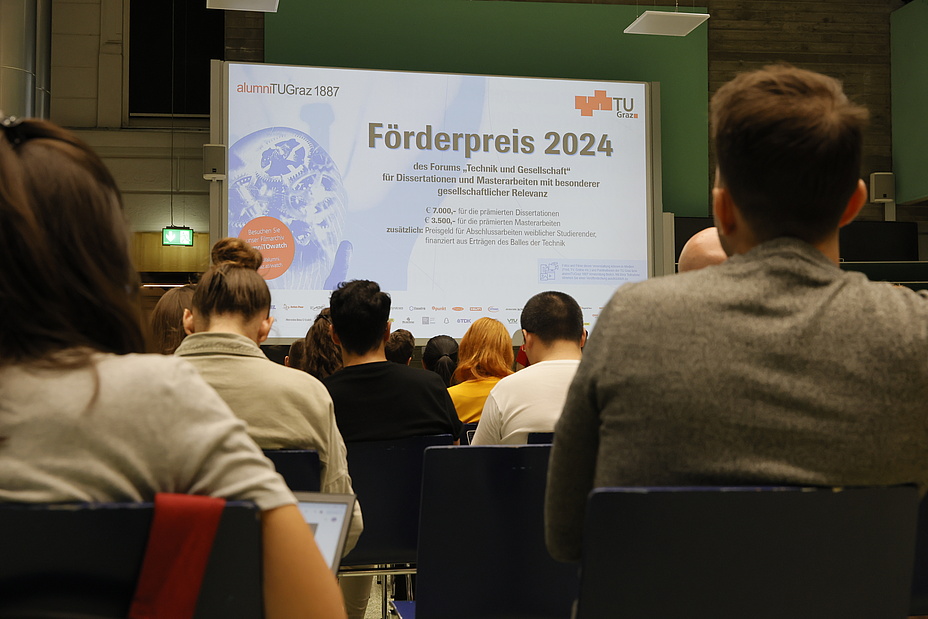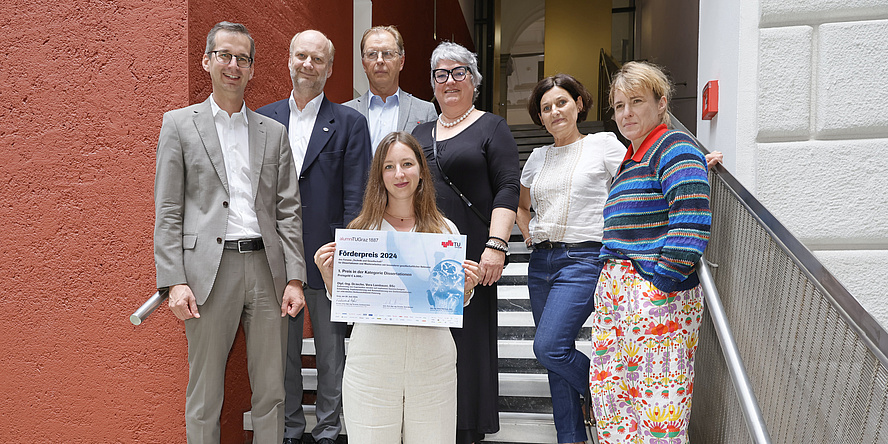With over 150 topics submitted, the 2024 Technology and Society Forum’s Sponsorship Awards set a new record, as organiser Katharina Mitsche emphasised in her presentation. The task of the six-member jury was to draw up a shortlist of six Master’s theses and six doctoral theses of particular social relevance from all the submissions. For the first time, women dominated the shortlist this year with a total of seven theses. At the end of June, the selected topics were presented at the Alte Technik and the winning projects chosen. A total of 14,500 euros in prize money was awarded.
The architect Imke Brandt, a graduate of FH Joanneum, was awarded third prize in the Master’s thesis category for her design of an ‘inclusive learning centre’. The idea of inclusion is at the centre of the adult education building that is to be realised in Baden-Baden. With her building design, Brandt wants to actively counteract the marginalisation of people with disabilities.
Three prizes for battery research
The second prize in the category of Master’s thesis went to Tobias Kopp, who modelled a patented best-practice process for recycling lithium-ion batteries at Graz University of Technology (TU Graz). Put simply, the batteries are shredded in a controlled process and the recyclable materials are separated for recycling. With the spin-off ProtectLiB and Samsung SDI as the first customer, Kopp and his team are already working on the commercial realisation of his solution.
Two prizes in the doctoral thesis category also went to battery research. Simon Heindl developed a lean plug-in for the AVL Fire simulation software. This makes it possible to reliably assess at an early stage of vehicle development whether or not batteries in electric vehicles are at risk of overheating in the event of mechanical damage. Reindl received the third prize in the category of doctoral thesis.
The second prize in the category of doctoral thesis went to materials researcher Katharina Hogrefe. She was able to pass on to the audience her fascination with inorganic ceramics, in which sodium ions exchange energy, as a potential future alternative in battery production. And this without PowerPoint!
When bacteria make bioplastics from CO2
The first prize in the category of doctoral thesis went to Vera Lambauer. The bioprocess engineer focused on the topic of the future of converting CO2 into degradable bioplastics (PHB). Highly explosive oxyhydrogen gas is involved, which is why it was necessary to specially equip laboratories. As a result, TU Graz is now one of four research centres worldwide where this innovative method of greenhouse gas removal can be further developed.
The first prize for Master’s theses also went to a woman. Bio-researcher Lena Bauernhofer developed a new method for measuring absolute copy numbers and affinities of proteins. One field of application for her MAffCoN assays is the determination of HER2 cells, the increased occurrence of which is typical of certain aggressive types of breast cancer. Bauernhofer’s Master’s thesis is the basis for more precise diagnostics and more targeted therapies for the tumour. She had already received the Pink Ribbon Award from Österreichische Krebshilfe (Austrian Cancer Aid) in 2023.
This means that four out of six sponsorship awards went to women this year. In addition, two special ‘Women engineers design’ prizes were again given in 2024. Bernadette Ortner won a prize for her research into semi-transparent solar cells; and Imke Brandt’s inclusive adult education centre building also received a prize in this category.


